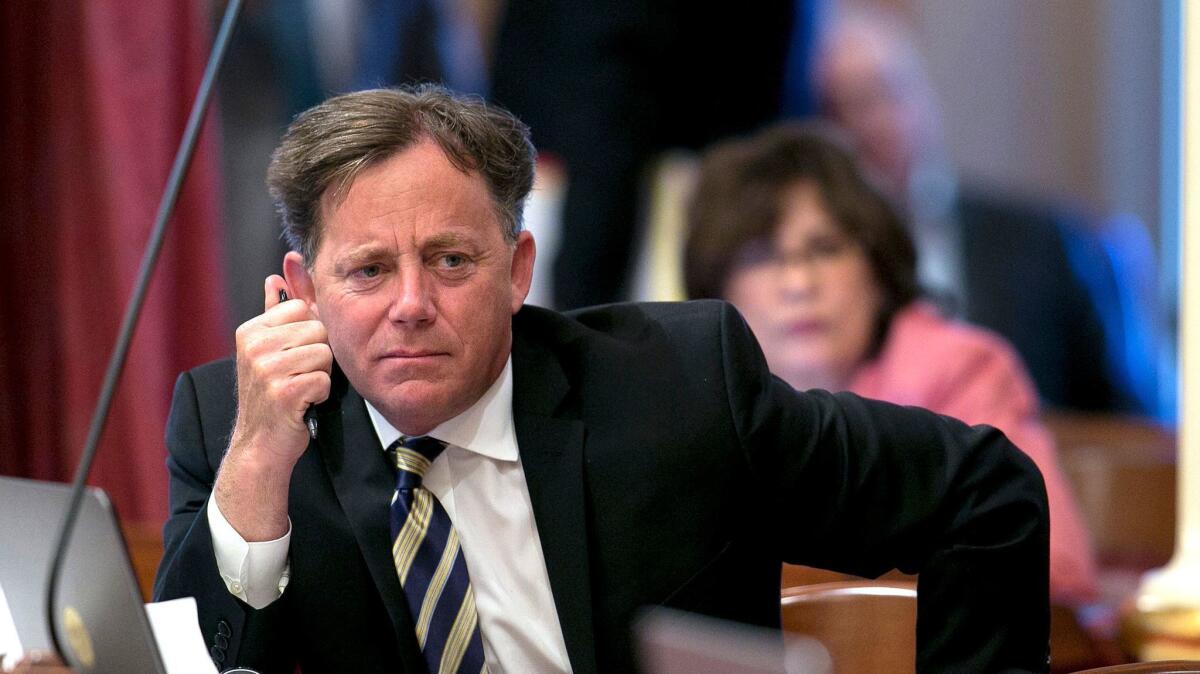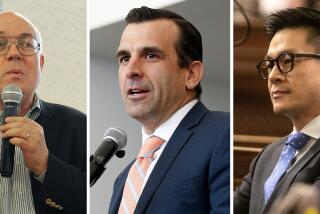California’s ethics agency could lift limits on funds to anti-recall campaigns. Critics say the move is tainted by secret talks

- Share via
Reporting from Sacramento — The state’s campaign watchdog agency is poised on Thursday to open the spigot for large political contributions that would help an embattled Democratic state senator fend off a recall campaign, a change that opponents say is tainted by secret talks between a commissioner and a Democratic attorney.
The state Fair Political Practices Commission last month began the process of lifting the $4,400 limit on political contributions by elected officials to anti-recall campaigns. The change was requested by Democrats to help state Sen. Josh Newman (D-Fullerton), who is facing an effort to remove him from office after his vote in April for a $52-billion gas and vehicle tax package.
FPPC Commissioner Brian Hatch is facing criticism for communicating before the vote with an attorney for the Senate Democrats, Richard Rios, holding a private meeting and exchanging emails and text messages that appeared to strategize on passing the policy change.
Hatch, a Democrat and former firefighters’ union lobbyist, defended his communication with Rios, saying it was needed to counter what he saw as a bias in favor of keeping the existing policy — which Hatch said he saw as unfair — by commission staff and FPPC Chairwoman Jodi Remke. Hatch challenged the notion that a campaign to recall an official could receive unlimited contributions while those fighting a recall were subject to limits.
“I was shocked to see what lengths Chair Remke would go to in order to derail this effort,” Hatch told The Times. “She continues to imply that to vote to correct this grievous error is somehow corrupt.”
Rios said such private communications are “common and expected practice” at the FPPC.
A manual for commissioners says they are “strongly urged” to disclose private, “ex parte” communications, but Hatch noted it does not prohibit these discussions as “long as issues of fairness and bias” are considered.
“There was absolutely nothing improper about my talking to Mr. Rios privately about his pending request for a commission opinion,” Hatch added.
Remke has asked the state attorney general’s office to provide training to the panel on the state open meeting law and ex parte communications, FPPC spokesman Jay Wierenga said Tuesday.
“After that meeting, we will decide whether any changes are necessary,” he said.
Supporters of the recall say Hatch’s actions and the commission’s vote are part of a series of attempts to keep Newman in office so Democrats can keep their two-thirds majority in the Senate. In June, lawmakers and Gov. Jerry Brown revised the rules governing recall efforts to delay a special election. That new law is being challenged in court.
“Sleazy maneuvers are their last desperate attempt to cling to power,” said Jon Coupal, president of the Howard Jarvis Taxpayers Assn.
Brian Hildreth, an attorney for the state Republican Party who opposed the change in policy, said Hatch should have followed the lead of other commissioners who, in the past, have disclosed ex parte communications.
Not disclosing the communication “tends to erode trust in government,” Hildreth said.
The private communications via text and email between Hatch and Rios were obtained through a Public Records Act request by the Los Angeles Times and were first reported by the Sacramento Bee and Associated Press.
After the commission’s chief counsel wrote a memo opposing the policy change, Rios sent a text message to Hatch: “Have you seen the FPPC memo on the opinion request. Hardly a fair and balanced approach. I thought you asked them to prepare the issue briefing both sides of the issue.”
Responded Hatch: “Yes I did… more work to do.”
At another point a month before the July 27 vote, Rios sent a text message to Hatch saying he was making a change to his written argument to the commission after talking to Hatch.
“Ok, will change. Otherwise good?” Rios texted.
“I think it’s good to go,” Hatch texted back, noting the attorney’s letter included a 2006 case on a similar subject. “The Schwarzenegger suit seems to fit nicely. Good job.”
Rios responded: “Thanks! Will submit tomorrow morning first thing.”
Commissioners should be able to ask questions of attorneys involved in a policy debate outside of the commission meeting, but such contacts should be disclosed, said Jessica A. Levinson, a professor at Loyola Law School and president of the Los Angeles Ethics Commission.
“Commissioners should absolutely be free to educate themselves on the issues and to talk to people with a variety of viewpoints,” Levinson said. “However, at a certain point, those discussions can start to look like backroom deals.”
A stronger policy requiring disclosure would help, said Robert Stern, who was the FPPC’s first general counsel.
“I would not prohibit such [ex parte] discussions, but I think a rule requiring disclosure is very appropriate,” Stern said.
Twitter: @mcgreevy99
Updates on California politics
ALSO
Lawmakers approve changes to California election law after a bitter budget debate
Campaign to recall Newman submits more than enough signatures to force a special election
More to Read
Get the L.A. Times Politics newsletter
Deeply reported insights into legislation, politics and policy from Sacramento, Washington and beyond. In your inbox twice per week.
You may occasionally receive promotional content from the Los Angeles Times.









